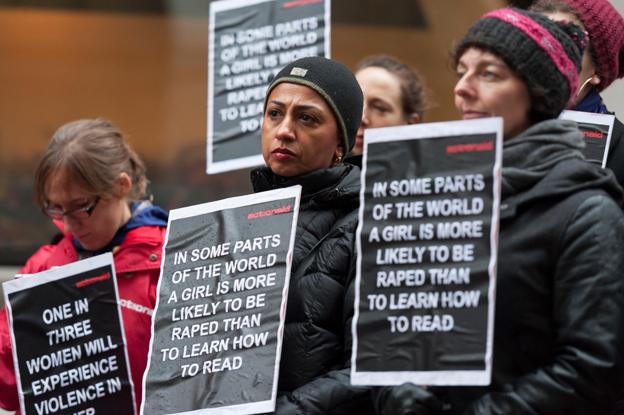The truth behind the rise in sex crimes
- Published

Today's figures showing a 20% annual increase in recorded rapes and a 17% rise in sexual offences reported to police in England and Wales may seem like evidence of a horrifying social trend. But perversely, the statistics are actually a cause for optimism.
Survey data and academic research has long indicated that the criminal justice system was identifying only a fraction of the sex crimes being committed. Most victims were suffering in silence.
"Sex offences" is probably the most damaging crime category of all. The effects are likely to be psychologically devastating for years, sometimes a lifetime. People usually recover quite quickly from a burglary, theft or even a mugging. But rape and sexual abuse offences have a long, grim tail.
Police and prosecutors have put great effort into encouraging victims to come forward - the belief being that a trusted state justice system is an effective tool in reducing the profound harm caused by sexual crime of all kinds.
That is why the revelation, buried within today's crime figures, that last year police recorded more than 1,000 incidents of rape against boys younger than 13, may be regarded as a welcome development. It is an increase of 54% on the previous year and more than double the number identified in any year before 2009.
There were more than 2,700 recorded rapes against girls under 13 - a rise of 25% on the previous 12 months and the highest ever recorded. This is evidence not of a more brutal society, but arguably a more sympathetic one.
Some of this increase is a consequence of what has been described as the "Jimmy Savile effect". Police launched their Operation Yewtree inquiry in October 2012, encouraging victims of Savile and others to come forward and report sexual offences.
The scandal also saw the Crown Prosecution Service change its guidance on the weight given to testimony from alleged victims. "The days of the model victim are over," the then Director of Public Prosecutions Keir Starmer announced. "From now on these cases will be investigated and prosecuted differently, whatever the vulnerabilities of the victim."
Police and other agencies signed up to a joint protocol designed to make it less traumatic for the victims of sex crimes to tell their stories, whenever the alleged offence was committed.
But only half of the 17% increase in recorded sexual offences in England and Wales is related to historical allegations. The other half reflects crimes allegedly committed in the last year. Other evidence suggests non-historical cases may represent 70% of the rise. The trend is more than just the result of lifting old stones.
As well as being encouraged to take allegations more seriously, police officers also had their wrists slapped recently for the way they record sexual offences reported to them - specifically suggestions that victims have had their reports of rapes and sexual assaults inappropriately "no-crimed" or ignored. The Metropolitan Police are currently reviewing their processes.
There was also new Home Office guidance issued in April 2010 on how police forces in England and Wales should record sexual offences - changes which, it is believed, may have seen greater identification of such crime.
There will be some who worry that this new focus on the victims of sex crime will inspire a wave of bogus allegations, with reputations unfairly but terminally shredded, irrespective of the outcome in a courtroom.
The acquittals of soap stars Bill Roache and Michael Le Vell, and the Commons' former deputy speaker Nigel Evans following sex offence charges, have raised suggestions about over-zealousness on the part of police and prosecutors when it comes to such cases.
But we may still only be touching the edges of a social problem that profoundly damages millions of lives. Last February, the Crime Survey of England and Wales estimated that 2% of adult women and 0.5% of men had experienced some form of sexual assault or attempted assault in the previous year.
Just think of that finding for a moment - 2% of adult women amounts to approximately 460,000 people estimated to have suffered sexual assault or attempted assault in the previous 12 months. Among adult men the figure is more than 100,000.
The NSPCC calculates that a million children are being sexually abused at any one time. A survey of young people conducted in 2002 suggested 15% had experienced such abuse during childhood.
So the news that police recorded almost 61,000 sexual offences last year, up from 52,000, suggests we are inching our way forwards.